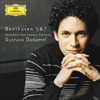Beethoven Symphonies Nos 5 & 7
It requires guts to take on Kleiber,and Dudamel steps up to the plate
View record and artist detailsRecord and Artist Details
Composer or Director: Ludwig van Beethoven
Genre:
Orchestral
Label: Deutsche Grammophon
Magazine Review Date: 11/2006
Media Format: CD or Download
Media Runtime: 69
Mastering:
Stereo
DDD
Catalogue Number: 477 6228

Tracks:
| Composition | Artist Credit |
|---|---|
| Symphony No. 5 |
Ludwig van Beethoven, Composer
Gustavo Dudamel, Conductor Ludwig van Beethoven, Composer Simón Bolívar Youth Orchestra |
| Symphony No. 7 |
Ludwig van Beethoven, Composer
Gustavo Dudamel, Conductor Ludwig van Beethoven, Composer Simón Bolívar Youth Orchestra |
Author: Richard Osborne
It is a useful rule of criticism that there is no point in berating a pear for not tasting like a peach. I make the point because this is a most unusual record. The arrival on the prestigious DG label of a new coupling of Beethoven’s Fifth and Seventh by a conductor barely known to record-buyers might well trigger a Pavlovian response. Has the company conjured forth another Carlos Kleiber?
Well, not exactly. Kleiber was 44 when he recorded his famous account of the Fifth; an interpreter of rare intuitive genius, his craft had been honed over 25 years of painstaking work. The 25-year-old Venezuelan Gustavo Dudamel is a rather different phenomenon. He has made a name for himself as the charismatic principal conductor of the Simón Bolívar Youth Orchestra, a world leader in the pioneering of “Social Action through Music”. In the politico-cultural context in which classical music operates, this is marketing gold.
On the evidence of these performances – a vibrant, glowing Seventh and a poorly thought-out, run-of-the-mill Fifth – Dudamel is a born conductor but an unpractised interpreter. His style suggests a longing to return to the glory days of an era which ended with the deaths of Bernstein, Karajan and Solti. The sound is full-bodied and carefully groomed; there is no antiphonal division of the violins; repeats are in short supply. Yet who can entirely object when the playing is as glorious as much of this is?
The Fifth is bedevilled by a lack of a through pulse in the first movement development and coda, and otiose broadenings of the motto at the end. The Andante con moto begins at a funereal quaver=66, narcissistically phrased, and getting slower (only Bruno Walter has recorded a more protracted performance). The Scherzo is also ponderously done. Where Klemperer used a similar pulse to translate one bar of the Scherzo into half a bar of the finale at Beethoven’s excellent mm=84, Dudamel throws away the advantage by treating the finale (shorn of its exposition repeat) in too racy a manner.
There are imbalances in the Seventh, too – a dashing Scherzo with a dragging Trio in the olden style. That said, the performance brings out the best in Dudamel’s conducting: its visceral energy, its generosity of spirit (and phrasing), its heart-warming nurturing of a belief that every note matters. The orchestra responds nobly to his demands. The finale is a dead ringer for Karajan’s 1983 Berlin version, which is saying something. For these young musicians to come within hailing distance of so fabled an ensemble is an earnest of just how special they are.
Well, not exactly. Kleiber was 44 when he recorded his famous account of the Fifth; an interpreter of rare intuitive genius, his craft had been honed over 25 years of painstaking work. The 25-year-old Venezuelan Gustavo Dudamel is a rather different phenomenon. He has made a name for himself as the charismatic principal conductor of the Simón Bolívar Youth Orchestra, a world leader in the pioneering of “Social Action through Music”. In the politico-cultural context in which classical music operates, this is marketing gold.
On the evidence of these performances – a vibrant, glowing Seventh and a poorly thought-out, run-of-the-mill Fifth – Dudamel is a born conductor but an unpractised interpreter. His style suggests a longing to return to the glory days of an era which ended with the deaths of Bernstein, Karajan and Solti. The sound is full-bodied and carefully groomed; there is no antiphonal division of the violins; repeats are in short supply. Yet who can entirely object when the playing is as glorious as much of this is?
The Fifth is bedevilled by a lack of a through pulse in the first movement development and coda, and otiose broadenings of the motto at the end. The Andante con moto begins at a funereal quaver=66, narcissistically phrased, and getting slower (only Bruno Walter has recorded a more protracted performance). The Scherzo is also ponderously done. Where Klemperer used a similar pulse to translate one bar of the Scherzo into half a bar of the finale at Beethoven’s excellent mm=84, Dudamel throws away the advantage by treating the finale (shorn of its exposition repeat) in too racy a manner.
There are imbalances in the Seventh, too – a dashing Scherzo with a dragging Trio in the olden style. That said, the performance brings out the best in Dudamel’s conducting: its visceral energy, its generosity of spirit (and phrasing), its heart-warming nurturing of a belief that every note matters. The orchestra responds nobly to his demands. The finale is a dead ringer for Karajan’s 1983 Berlin version, which is saying something. For these young musicians to come within hailing distance of so fabled an ensemble is an earnest of just how special they are.
Discover the world's largest classical music catalogue with Presto Music.

Gramophone Digital Club
- Digital Edition
- Digital Archive
- Reviews Database
- Full website access
From £8.75 / month
Subscribe
Gramophone Full Club
- Print Edition
- Digital Edition
- Digital Archive
- Reviews Database
- Full website access
From £11.00 / month
Subscribe
If you are a library, university or other organisation that would be interested in an institutional subscription to Gramophone please click here for further information.




